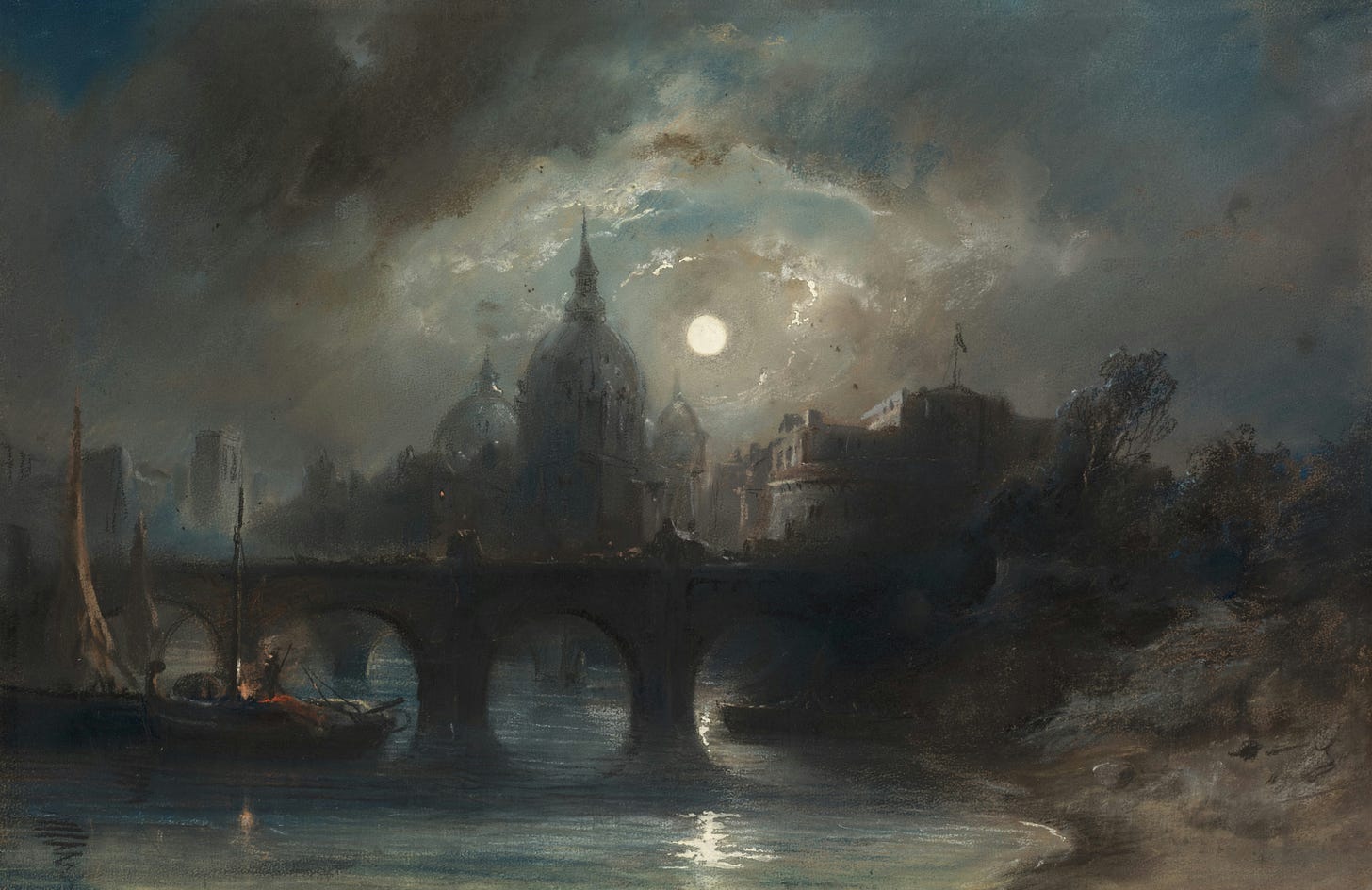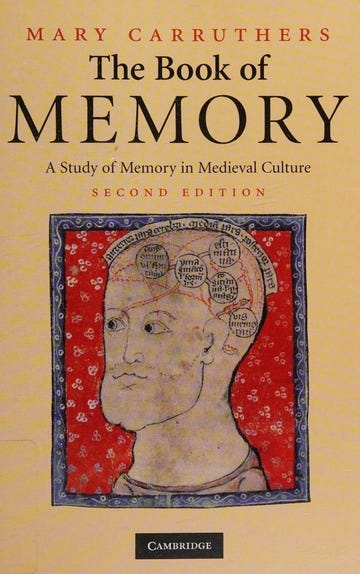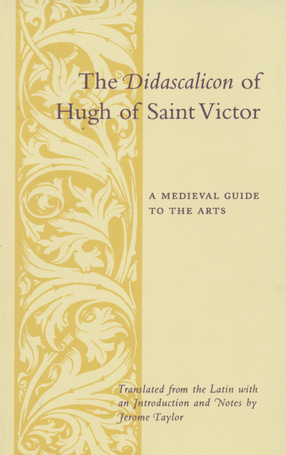The Lost Art of Memory
A commentary on novelty's rise, memory's fall, and what vanished in between
I’ve been reading Mary Carruthers’s great work The Book of Memory, where she opens with a surprisingly basic insight, from which I think much else flows:
It’s a simple distinction in emphasis about the importance of memory or recollection, for the medieval and antique mind, versus the importance of imagination and creativity, in the modern one. Carruthers explores this difference by way of a comparison between St. Thomas Aquinas and Albert Einstein—two people their contemporaries “universally recognized to be men of remarkable scientific genius.” However, she’s interested in some key differences between them. She writes: “What is strikingly different is that in the one case this process and product are ascribed to intuition and imagination unfettered by ‘definite’ tracks [Einstein], in the other to a ‘rich and retentive memory’ [Thomas], which never forgot anything and in which knowledge increased ‘as page is added to page in the writing of a book.’”
I think as a people who have almost unending access to notepads, note apps, and voice and video recording, it seems reasonable for us to be a people who have let memory slide in favor of creativity. As the need to keep things in mind—lucidly, in active memory, rather than statically, in media—decreases substantially, it makes sense that we would make this kind of shift. Think, for example, of how many scholars read from prepared papers, rather than speak from memory. Yet this convenience likely comes at a cost—we may be losing access to a fundamentally different way of thinking and perceiving, one that emerges only through a deeper form of engagement with memory.
To elaborate on Carruther’s point, we are exploring two very different types of mind: the mind with a lesser need for elaborate memory (because of recording technology) and the mind that must rely substantially upon it for insight, understanding, and expression. Carruthers suggests that this Medieval mind was “fundamentally memorial” whereas the “modern culture in the West is documentary.”
Memorial and documentary—that’s a distinction worth holding on to.
And, it’s worth exploring in this context just how capable was Thomas’s memory and his ability to recite and express his thoughts from it. Carruthers recovers a number of anecdotes along these lines from Thomas’s secretaries, including the radical claim that Thomas would at times fall asleep and continue his recitations, a sleep that Carruthers suggests may have simply been another, deeper form of Thomas’s concentration. Even more astonishingly, we read that Thomas would at times dictate his texts to three or four secretaries all at once and on different topics.
Here she is describing Thomas’s level of concentration:
That unceasing torrent, that clarity as though reading from a book before his eyes, that quality of retaining whatever he had read and grasped, can be understood if we are willing to give his trained memory its due. Thomas himself stresses the importance of concentration in memory, and we are told many times of his remarkable power of deep concentration, often approaching a trance-like state in which he did not feel physical pain. Thomas communed with his memory constantly, certainly before he dictated, and only when he clearly had ‘the understanding and the words required’ (my emphasis) would he lecture or write or dictate.”
This is a different kind of mind, indeed, and while Thomas may be an outlier in his ability, he’s not alone in emphasizing these memory practices. For example, Hugh of St. Victor would in his Didascalicon (c. 1130 CE) remark similarly that all learning depends on three things: aptitude, practice, and discipline. The first of these three is tied closely to memory. He writes, “Those who work at learning must be equipped at the same time with aptitude and with memory, for these two are so closely tied together in every study and discipline that if one of them is lacking, the other alone cannot lead anyone to perfection—just as earnings are useless if there is no saving of them, and storage equipment is useless if there is nothing to preserve. Aptitude gathers wisdom, memory preserves it.”
Hugh goes on to say that aptitude is trained principally by two practices—reading and meditation. On the relation between the two, he writes:
Meditation is sustained thought along planned lines: it prudently investigates the cause and the source, the manner and the utility of each thing. Meditation takes its start from reading but is bound by none of reading’s rules or precepts. For it delights to range along open ground, where it fixes its free gaze upon the contemplation of truth, drawing together now these, now those causes of things, or now penetrating into profundities, leaving nothing doubtful, nothing obscure. The start of learning, thus, lies in reading, but its consummation lies in meditation; which, if any man will learn to love it very intimately and will desire to be engaged very frequently upon it, renders his life pleasant indeed, and provides the greatest consolation to him in his trials.
We tend not to engage in this kind of high-level memory practice anymore simply because we don’t need to, but one wonders what the mind would look like today if we again emphasized memory and meditation in this way, especially now in the context of LLMs doing not just the memorizing for us, but some of the actual expressing, too.
I suspect we’re losing a lot.
We can further stipulate that whereas in the Medieval period the selection criteria for intellectual work weighted heavily toward memory, in our modern period we select heavily for novelty. Not just novelty in sources used but novelty in our expression—in new ideas, new terms, and new perspectives.
Think, for instance, that every morning the timeline is filled not with the repetition of timeless ideas worked over again and again in an exercise that over time begins to reform us, but with an ever-increasing number of new ideas that circulate quickly and then vanish again before the next cycle begins the following day.
It raises the question, What happened yesterday? Do we even remember? We may be documentarians but we are also quite forgetful.
Now, I can imagine the situation reversed—a situation we likely inhabited for centuries—where ongoing repetition and appeal to existing sources quashed any impulse to the new, but that is not the situation we find ourselves in today. And, in the context of this onslaught of ever-increasing novelty, I think we can say:
Today, novelty is overrated.
Does that mean novelty is always bad? No. Does that mean that novelty isn’t also at times a creative re-working of existing ideas in a new context? Also no. But today we are saturated with it, and it’s always worth examining whether the current saturation is actually serving us or whether we are simply being pushed forward by the inertia of our own unthinking habits, or, as this case may have it, that we are producing works in a manner that simply suits our current media ecology, rather than works that might actually provide us with the insights and practices that we truly need.
I’m certainly no exception to this dynamic. You can call this piece a self-commentary.
Plato of course explored this same tension through his concept of the pharmakon—a term meaning both “remedy” and “poison.” In the Phaedrus, Plato presents writing as a pharmakon that promises to enhance memory while also undermining it. Does not this duel nature capture our modern relationship with technology and novelty? Our devices and platforms promise to enhance our capabilities—to make us more creative, more productive, more connected, more novel—while simultaneously threatening to diminish our native powers of memory and contemplation.
The question, then, isn’t whether these tools are simply good or bad, but rather how we might understand them as having complex affects, some desirable, others not. We are looking for the underlying logic of effects produced by our techniques and technologies. And, just as Plato understood writing as a technology that could either support or supplant our true memory, we must grapple with how our modern tools can either deepen or dissolve our capacity for sustained thought and genuine understanding.
In this vein, we must also ask what we are actually doing when we remember.
Hugh notes that memory is kind of “gathering,” a point we also find pronounced in Augustine, something quite different from memory as “retrieving” (from notes, a database, a recording). In other words, to remember is to gather—it’s an activity, a practice—and without such a gathering together of thinking through memory we have a distinct dispersal, a kind of thinning out of thought that lacks the depth of its repetitive, meditative engagement. In this sense, Thomas is something of a savant gatherer, and it’s likely to me that this kind of deep gathering of thinking through memory allows for the unfolding of a different kind of awareness.
So, we must read and read again, exercising memory, not only to retain what we have read, but because we gain access through these practices to a different kind of thinking and attending, and thus to a different kind of perceiving and acting—to a world that unfolds only in the deeper richness of this expanded field of memory.
The medium is the message, as they say, and in the context of our thinking, the medium is our own mind, transformed by the practices we bring to bear on it.







Very thought-provoking! Thank you!
Sharing my post in return - https://alexandernaumenko.substack.com/p/memory
In my twenties, I committed to memory all of Keats’ major odes together with a number of soliloquies from Shakespeare’s work and I still can’t describe exactly the effect it had other than to say that it had one. My general impression about memory is that it allows for a sort of panoramic or synchronic insight into a subject that is simply not possible if one is constrained to consulting external texts diachronically. Insofar as the insight is achieved through the diachronic encounters, it’s only because the prior encounters have been retained in memory and so one has actually shifted to the first method here. Memory is the mother of insight.